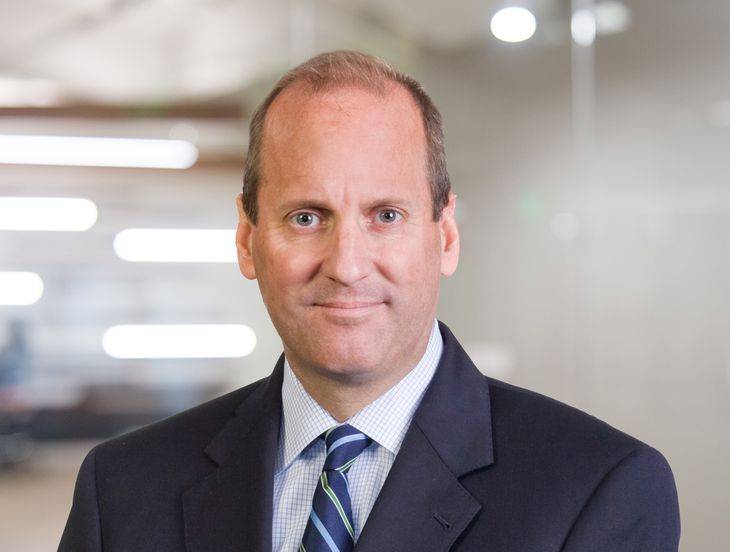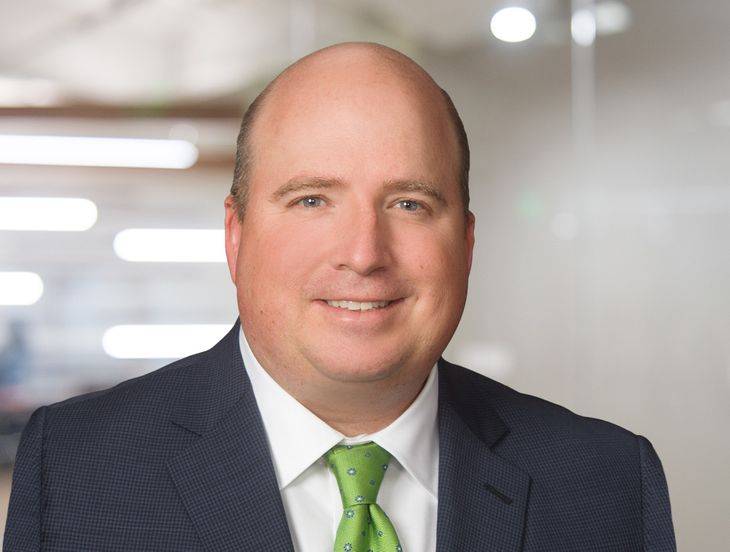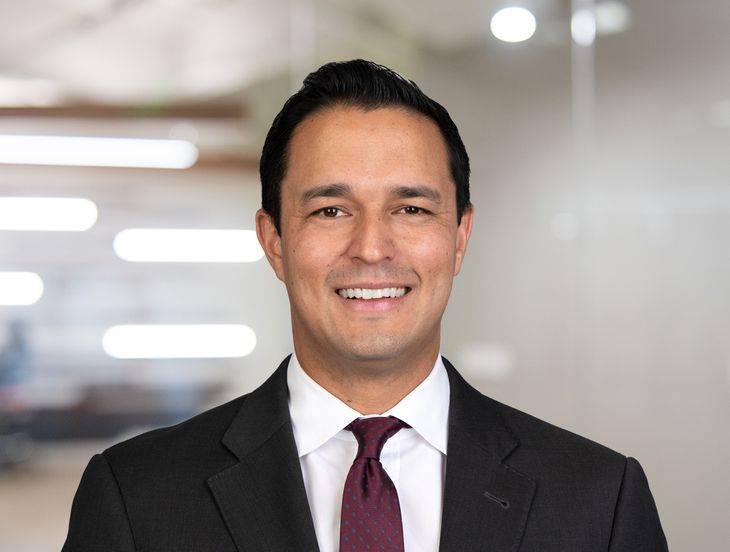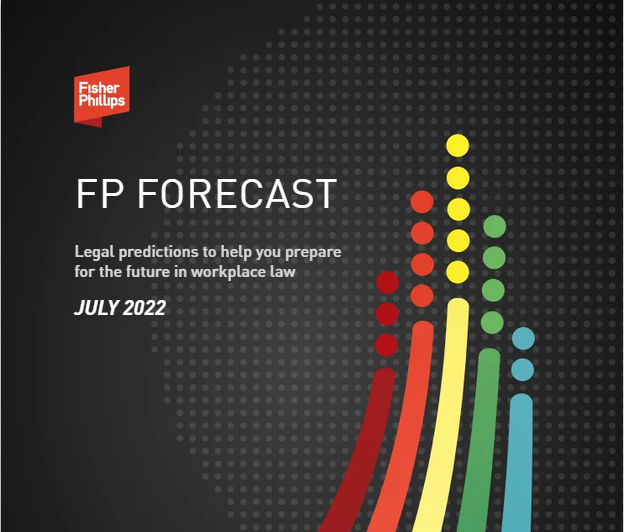FP Forecast: July 2022 Edition
Insights
7.20.22
Welcome to FP Forecast, a monthly outlook featuring Fisher Phillips thought leaders providing their insights into what employers can expect in 2022 and beyond. By following along each month, you’ll be in the best position to anticipate the expected changes and prepare your organization for what lies ahead. This month we look at the future of background screening and pay equity – and take a special look at what hospitality employers and the sports industry should prepare for.
Michelli Rivera, Rich Millisor – co-chairs of FP’s FCRA and Background Screening Group
Tensions Will Grow as Employers Adjust Background Screening Standards
You might feel like you are suffering from whiplash as you adjust your background screening standards. All through 2022, many employers have responded to the labor shortage by loosening criminal history standards – or not running criminal background checks at all. We’ve also seen this with drug and alcohol testing. Another common trend has seen employers start workers in their jobs before they get background check results back. But a confluence of three events has now caused employers to begin to spring back to normal standards:
- Some industries have begun to experience a softening of the labor market, which permits employers to be choosier when hiring;
- An increase in negligent hiring claims related to newer workers who may have been disqualified in a normal labor market; and
- Increased pressure to provide safe workplaces given the recent rise in shooting violence.
This dynamic will lead to a growing area of tension in the upcoming months as employers aim for a happy medium and employees and candidate adjust to a “new” new normal.
Plaintiffs’ Lawyers Will Get Creative When Exploiting Background Check Quirks
We’ll see plaintiffs’ lawyers target unsuspecting employers with novel theories and creative attacks for the rest of 2022, especially as employers begin erecting hiring hurdles they haven’t deployed in several years.
- We’ll see the plaintiffs’ bar look for novel ways to escape Article III standing requirements (which typically require workers to show actual damages before they can get to court) to take advantage of widespread non-compliance with FCRA’s technical notice requirements – like disclosure, authorization, and pre-adverse notifications.
- Similarly, plaintiffs’ lawyers will push the envelope on new theories challenging third-party background check authorizations given the complex web of staffing and employment relationships that mark the modern era. When employees authorize staffing agencies to obtain background reports during hiring, employers may have expectations that those staffing agencies will follow FCRA procedures – but this isn’t always the case, and you could find your organization facing legal exposure for their mistakes.
As you look toward the end of 2022, now would be a good time to revisit your third-party relationships to make sure you are all on the same page when it comes to background check compliance.
Pay Equity
Kathie Caminiti, Cheryl Behymer, Cheryl Pinarchick – co-chairs of FP’s Pay Equity Practice Group
Feds Will Push for Pay Data Reporting – But Courts Will Push Back
Expect to see the Biden administration push to reinstitute the federal EEO-1 “Component 2” reports that require employers to collect and turn over pay data and hours worked information to the government. We should see the first step in this renewed federal initiative, originally spearheaded during the Obama years and only briefly taking effect before being ended by the Trump administration, to be resurrected before the end of the year by leaders at the EEOC and OFCCP. But a recent Supreme Court decision that knocked back the EPA in a non-workplace case could see lower federal courts reject the agencies’ efforts to ratchet up reporting requirement. Look for business advocacy groups to file suit against the government to halt this expected move before the year is out.
Pay Data Transparency Will Be All the Rage at the State Level…
But even though federal efforts might be blocked by courts, you can bet there will be a lot of pay equity action at the state level. Following in Colorado’s footsteps, we’ll see more states require public posting of pay ranges – some perhaps by the end of this year. While the National Labor Relations Board has long held that even non-unionized employers cannot force most employees to keep their compensation confidential, these state laws will be a significant step in advancing pay equity and arming workers with critical knowledge. Be prepared to post salary ranges – either upon request or as a matter of routine as part of job postings – and for the inevitable fallout.
…And Litigation Will Follow
The most common fallout we’ll see? An increase in compensation disparity litigation, both on an individual and class action basis. This will be a natural result of compensation information becoming more public and readily available. Employees will increasingly claim their pay is discriminatory because of their membership in a protected class — and not just gender disparities. Expect to see litigation over race, national origin, and perhaps age discrimination allegations. Like the explosion of exempt/non-exempt classification class actions a few years ago, we’ll see savvy plaintiffs’ attorneys ask plaintiffs if they have complaints about their pay during their own case intakes. Given that data will be more easily available, these cases could easily expand to class action status.
You Will Need to Update Gender Markers
More states – and perhaps even the federal government – will add either a “non-binary” gender category or provide multiple gender choices other than male/female to standard forms in the coming months. You need to ensure your own HRIS database and applicant systems, where applicable, are compliant with the relevant gender options.
Hospitality Industry
Andria Ryan, Alden Parker – co-chairs of FP’s Hospitality Industry Team
Increased Union Activity
Faced with staffing challenges, pressure for higher wages, better working conditions, and the push for employers to embrace socially responsible causes, hospitality employers will likely see increased protected concerted activity and an uptick in union representation organizing.
Increased Activity at the Agency Level
Gridlock has largely prevailed at the congressional level over the last two years – and it’s all but certain this will even worsen after the November midterm elections result in a Congress controlled in whole or in part by Republicans. With a decreased likelihood of achieving policy victories through legislation, the Biden administration will pivot to increased activity at the administrative agency level. This could take the form of enhanced enforcement activity by federal agencies (DOL, OSHA, NLRB, etc.). The DOL Wage Hour division has already announced plans to hire more investigators and other agencies may follow suit. We will also see increased regulatory proposals from federal administrative agencies. These proposals will reflect the administration’s “worker oriented” outlook, leading to more restrictive rules for employers. Whatever activity we see at the federal agency level could be duplicated (or increased) at the state agency level, particularly in certain progressive jurisdictions.
Death to the Tip Credit
The DOL WHD’s reinstitution of the “80/20 Rule” includes additional twists that will make it challenging for hospitality employers to rely on the tip credit. When you couple that with anticipated increased activity at the administrative agency level, we’ll see more hospitality employers forced to implement alternative compensation structures in place of the tip credit, such as reliance on the “7(i)” exemption and the introduction of service charges. Additionally, hospitality employers will see increased focus on other wage and hour issues unique to the hospitality industry, such as tip pooling.
Sports Industry
Adam Sloustcher, Todd Scherwin – co-chairs of FP’s Sports Industry Team
Professional Sports Teams Need to Bone Up on Crypto, Blockchain, and NFTs
You might think that the massive downturn in the cryptocurrency market would allow you to ignore it, but you’d be wrong. Professional athletes remain enamored with the high-risk, high-reward nature of cryptocurrency and will continue to go all-in on NFTs for the foreseeable future. 2022 has seen two of the largest sports leagues in the world, the UFC and the NBA, launch various cryptocurrency initiatives designed to enhance the fan experience. And the path they have begun to walk provides helpful guideposts to consider on how to properly integrate crypto and blockchain in your organizations.
College Athletics Will Face Renewed Strain Over Athlete v. Employee Debate
While you might be distracted by the relatively new issue of NIL and how that shapes your departmental priorities, make sure you keep your attention on the long-running debate about whether student-athletes should be classified as employees. The latest battleground for this issue is at the National Labor Relations Board, which is expected to issue a decision by the end of the year that we believe will throw the college athletics landscape into further turmoil.
Amateur Sports Organizations Will Face Classification Concerns
As plaintiffs’ attorneys search for fertile ground to exploit, they will increasingly turn their attention to amateur clubs and organizations to determine whether you are classifying your coaches and staff correctly. Many organizations believe it makes the most business sense to label coaches as independent contractors, but that doesn’t always fit with the laws of the particular state in which you operate. Many states have erected hurdles in the recent past leading to a danger that your coaches are misclassified and should instead be treated – and paid – as employees. The problem is especially acute in California but will increasingly expand into other states for the remainder of 2022 and beyond.
Conclusion
We will deliver monthly FP Forecast insights forecasting what to expect across the entire spectrum of workplace law over the entire course of 2022, so make sure that you are subscribed to Fisher Phillips’ Insights to get the most up-to-date information direct to your inbox. If you have further questions, contact your Fisher Phillips attorney or the authors of this Insight.
Related People
-
- Cheryl L. Behymer
- Senior Counsel
-
- Kathleen McLeod Caminiti
- Partner and Co-Chair, Wage and Hour Practice Group
-
- Richard A. Millisor
- Regional Managing Partner
-
- Alden J. Parker
- Regional Managing Partner
-
- Cheryl Pinarchick
- Senior Counsel
-
- Andria Lure Ryan
- Partner
-
- Todd B. Scherwin
- Regional Managing Partner
-
- Adam F. Sloustcher
- Regional Managing Partner








